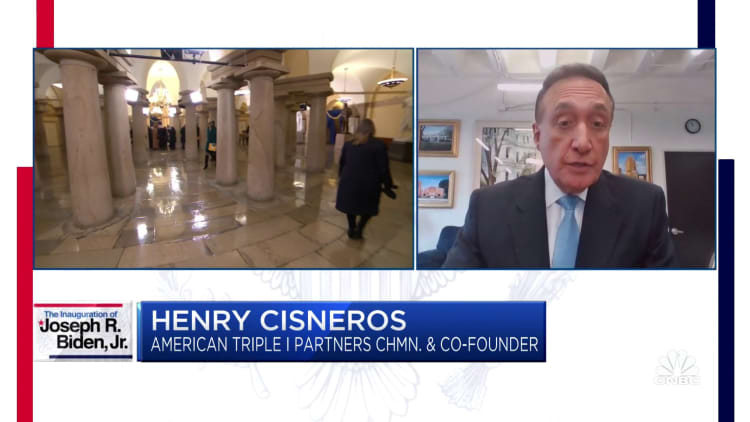President Joe Biden's allies in the business community have been meeting to craft a set of proposals, including a potential carbon tax, to help pay for an expected $2 trillion infrastructure plan.
One of those efforts, which started just after Biden was declared the winner of the election in late November, is being led by longtime Biden ally and New York business leader Dennis Mehiel, along with former Dow Chemical CEO Andrew Liveris, according to a person with direct knowledge of the matter.
Mehiel and Liveris have been reaching out to business leaders across the country to discuss ways they believe the Biden administration and Congress could move ahead with funding mechanisms for such a large-scale proposal, this person noted.
The plan is expected to come together after a few months, while Biden focuses on the Covid-19 pandemic and economic relief.
Discussions with various teams are expected to continue in the coming weeks. Some of the ideas are on course to be brought to Biden administration officials, along with congressional leaders. Sen. Chris Coons, D-Del., a Biden confidant, has also been on some of the calls, this person noted.
The people on the calls have discussed several ideas to pay for the plan, including a carbon tax, the person said.
A carbon tax is a "fee imposed on the burning of carbon-based fuels (coal, oil, gas)," according to the Carbon Tax Center. "Policymakers could use the resulting revenue to offset those impacts, lower individual and corporate taxes, reduce the budget deficit, invest in clean energy and climate adaptation, or for other uses," according to the Tax Policy Center.
The idea of a carbon tax previously came up in the Obama and Trump administrations.
Reuters reported in 2017 that Republican officials went to Trump with the idea of a carbon tax and the White House later pushed back on that concept.
Brian Deese, who also served as an advisor under Obama before he became Biden's National Economic Council director, reportedly said in 2016 that a carbon tax was not going to happen under that administration because of gridlock in Congress.
This time, however, the dynamic in Congress is different, with Democrats having a slim advantage in the Senate after winning the Georgia runoffs and Vice President Kamala Harris acting as the tiebreaker.
Along with pushing for large-scale upgrades to bridges and roads, Biden's plan has a heavy focus on clean energy technologies.
"Biden's proposal will make sure national infrastructure and clean energy investments create millions of middle-class jobs that develop a diverse and local workforce and strengthen communities as we rebuild our physical infrastructure," the campaign's plan says.
Mehiel declined to comment. Liveris and Coons did not respond to requests for comment.
Liveris also led former President Donald Trump's manufacturing council before it was disbanded after Trump's widely criticized response to the deadly white supremacist violence in Charlottesville, Virginia, in 2017.
Despite Trump running on improving American infrastructure, and his administration's numerous attempts to focus on the matter, the former president could not find a way to move ahead with a large-scale package. He reportedly disagreed with his own administration about how to structure the initiative.
Henry Cisneros, who was secretary of Housing and Urban Development in the Clinton era, is leading a firm that is identifying infrastructure targets for the Biden administration, CNBC reported on Wednesday.
In an interview with CNBC's Shepard Smith, Cisneros said he anticipates Biden's administration will start pushing for a "truly significant infrastructure package" in a few months.

Cisneros said he recently participated in a study that looked at how the coronavirus pandemic changed the infrastructure priorities for various cities. Those who said it did change their infrastructure priorities said they now believe they need to improve their broadband, transit and medical facilities.
Pete Buttigieg, a former Democratic presidential candidate and ex-mayor of South Bend, Indiana, is Biden's nominee to lead the Department of Transportation. The department will be responsible for implementing large parts of the president's vision for rebuilding the country's infrastructure.
During his confirmation hearing on Thursday, Buttigieg said improving infrastructure would help grow the economy.
"We must ensure all of our transportation systems — from aviation to public transit, to our railways, roads, ports, waterways, and pipelines — are managed safely during this critical period, as we work to defeat the virus," Buttigieg said.
Buttigieg himself proposed a $1 trillion infrastructure plan when he ran for president during the Democratic primary.


